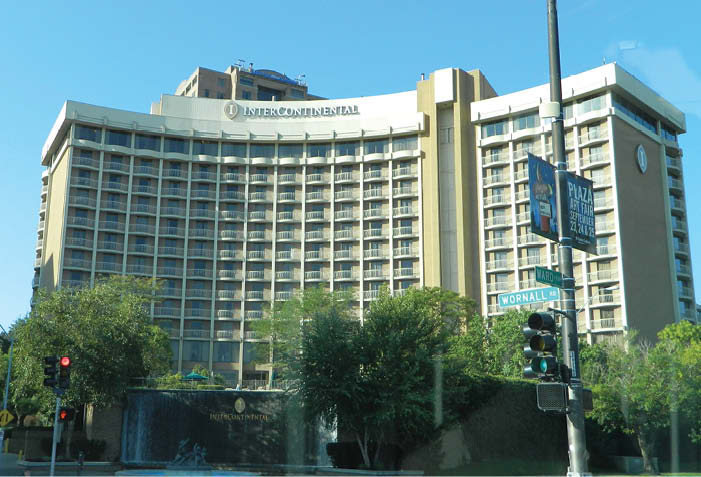By Paul Thompson
Northeast News
September 7, 2016
KANSAS CITY, Missouri – A controversial plan which would allow The Country Club Plaza’s Intercontinental Hotel to declare itself blighted was passed through the Planning, Zoning, and Economic Development committee on Wednesday, September 7.
The ordinance passed through committee 3-1, with 1st District Councilwoman Heather Hall serving as the lone dissenting vote. The successful motion was put forth by 4th District at-large Councilwoman Katheryn Shields, though she put the motion forward without a recommendation.
“We certainly need to support, in reasonable fashion, the ongoing success of our current existing hotels,” said Shields. “I am very comfortable with sending this out to the full council.”
The luxury international hotel chain is seeking the blight designation as part of a plan to establish the InterContinental Community Improvement District (CID). If the proposed district is indeed deemed blighted, the newly-formed CID would be able to issue a 1% sales tax on purchases made at the hotel. The plan calls for the InterContinental, which is the only business within the proposed district, to use that 1% sales tax to reimburse itself for roughly $15.9 million in renovations to the hotel.
Ordinance No. 160669 states that the CID would exist until either the district’s debts or satisfied, or after a period of 20 years. However, the ordinance furthers states that the CID can automatically renew for two successive 10-year terms without submitting a new petition to the city. According to the ordinance, the area would be determined as blighted based on “the predominance of insanitary or unsafe conditions and deterioration of site improvements, all of which individually and collectively constitute an economic liability, social liability and menace to the public health, safety, morals and welfare in its present condition and use.”
Committee chair Scott Taylor clarified the scope of the blight designation, re-affirming that it only refers to the hotel, and not the entire neighborhood.
“We’re not saying that the entire Plaza is blighted,” said Taylor. “We’re literally just looking at this structure, this building. I think it’s important to say that.”
3rd District City Councilman Quinton Lucas echoed the concerns of the community when he asked InterContinental representatives why, aside from the law allowing it, the hotel felt the need to raise capital improvement funds through the creation of a single-entity CID.
“This presents a single-owner CID, and I think there are many who would say that it’s less meritorious,” said Lucas.
Dave Fenley, a Husch Blackwell attorney representing InterContinental, responded that the hotel recognized it wasn’t a strong candidate for an abatement, but felt that a sales tax reimbursement through a CID could help fund renovations without being detrimental to the city’s bottom line.
“It’s a reimbursement tool here, because whenever it starts being levied, most of the work will have already been done.” said Fenley. “It doesn’t touch any taxing revenue.”
“We knew that we had no business asking for some sort of abatement tool, or some sort of TIF, but we thought this made some sense,” he added.
While the plan doesn’t include any TIF financing on the part of the city, some have worried that declaring The Plaza as blighted creates a dangerous precedent. For instance, other private businesses could be inspired to create similar CID’s in order to utilize sales taxes for their own renovations. While in this instance the sales tax will largely affect out-of-town visitors to Kansas City – InterContinental reps stated during the committee meeting that 97% of guests live in a zip code outside of Kansas City, Missouri – that wouldn’t necessarily be the case for other businesses looking to take advantage of the same loophole.
Lucas acknowledged ahead of the committee meeting that there have been concerns among council members about the precedent that the InterContinental CID would set.
“The loophole exists, the loophole is broad, and frankly, almost anyone can use it,” said Lucas.
Already, the proposed ordinance has drawn the attention of the hotel’s competitors. Brad Ellison, a general manager of a Marriott Hotel on the Country Club Plaza, indicated during the committee meeting that he was prepared to follow the InterContinental’s lead.
“Should this ordinance be successful, we’d also like to apply,” said Ellison.
Also of note: nearly all of the renovations currently proposed by the InterContinental are planned for the building’s interior. That includes over $7 million for the guest rooms and corridors, $1.2 million for the hotel’s restaurant, nearly $649,000 for the hotel’s lobby, and $648,000 for improvements to the parking garage. There is also $1.395 million set aside for “soft costs,” just shy of $900,000 in project management fees, and a $500,000 contingency. Meanwhile, only $205,730 is currently dedicated for exterior improvements.
The blight determination remains a sticking point for many members of the community. Noting that the current hotel owners bought the property only eight months ago, Kansas City resident Angie Lile said the need for renovations shouldn’t be a city concern. She also wondered what exactly the CID would be doing for the community.
“Obviously when the hotel was bought by the owners, they had to know the condition it was in,” said Lile. “Are you going to offer up any sort of incentives to the community around you?”
Before the close of the agenda item, Councilwoman Hall expressed her own hesitation to impose new taxes on visitors to Kansas City.
“I hate to have our citizens and our guests to our city to have to pay an increased amount of money to be able to stay here in our city,” said Hall. “When we impose more taxes on them, that doesn’t seem very welcoming.”
















